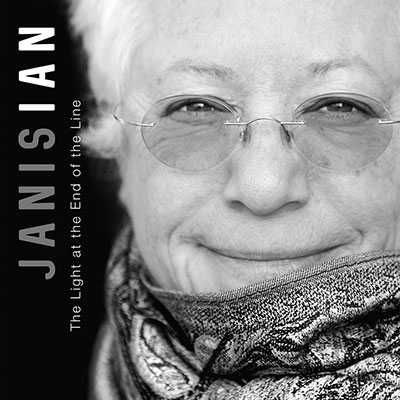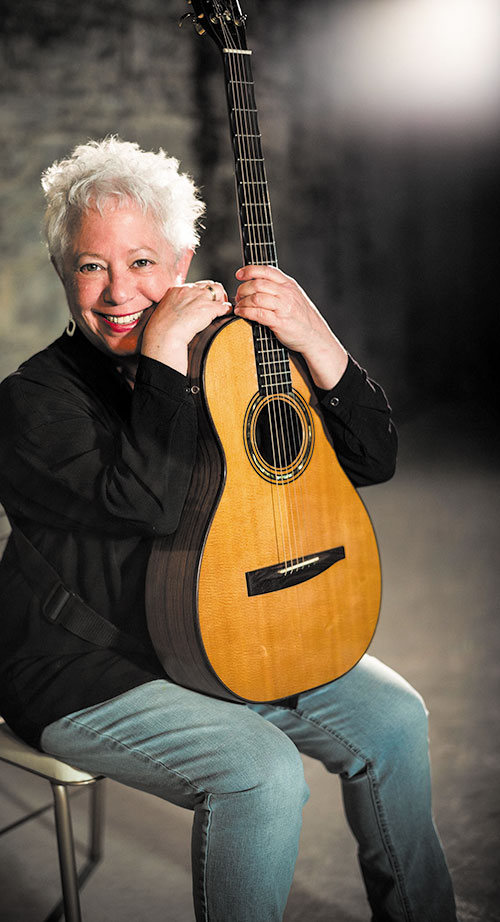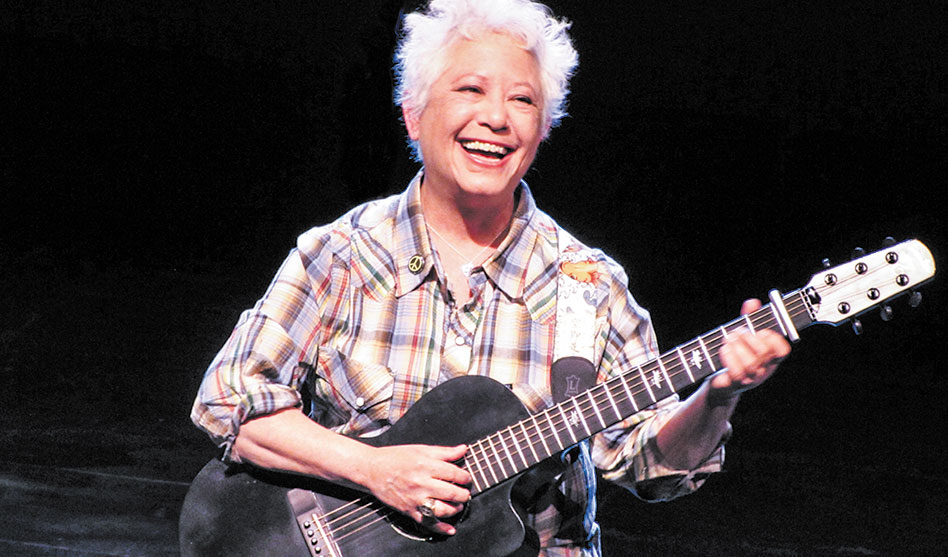Janis Ian (photo courtesy Lloyd Baggs)
Singer/songwriter Janis Ian talks about her career and her final solo studio album
GREGG SHAPIRO | Contributing Writer
GreggShapiro@aol.com
By my count, queer singer/songwriter Janis Ian has had four distinct chapters in her musical career. The first began when she was in her teens with the release of her groundbreaking single “Society’s Child”, and the albums on Verve Records that followed in the late 1960s.
By the mid-1970s, for the second chapter, Ian had signed to Columbia Records, resulting in the biggest hit single of her career, the Grammy Award-winning classic “At Seventeen.” She remained on Columbia into the early 1980s, even collaborating with Giorgio Moroder on the song “Fly Too High.”
The third chapter occurred in the early 1990s. Bette Midler recorded Ian’s song “Some People’s Lives,” the title track of Bette’s Grammy-winning 1991 album. Ian herself recorded the song for her marvelous 1993 comeback album, the aptly titled Breaking Silence.
Ian has not been sitting idle since that time, mind you. She’s released a few more albums, including some on her own Rude Girl Records label. She also published her memoir, Society’s Child: My Autobiography, in 2008 and won her second Grammy for the audiobook.
 I have had the pleasure of interviewing Janis in 1994, in 2004, in 2008 and now in 2022, and it is always a revelatory experience. She was kind enough to answer a few questions in advance of the release of her flawless — and Grammy-nominated new album — The Light at the End of the Line (Rude Girl).
I have had the pleasure of interviewing Janis in 1994, in 2004, in 2008 and now in 2022, and it is always a revelatory experience. She was kind enough to answer a few questions in advance of the release of her flawless — and Grammy-nominated new album — The Light at the End of the Line (Rude Girl).
Dallas Voice: I’ve been racking my brain trying to come up with the best way to say this, and I keep returning the fact that with The Light at the End of the Line, your extraordinary last solo studio album, you are going out with a bang. Janis Ian: [Laughs] better a bang than a whimper!
What was involved in the decision to make this your final studio recording? I think hitting 70 was a big part of it. Having the last 15 years to put together songs and wanting to make something that was better than anything I’d done before was involved. Mostly, the timing really worked out.
I went into lockdown right around when I needed or wanted to start thinking about this. I had no plans until I looked up at my write board and realized I had 15 songs I was pleased with, and one unfinished. I started listening to what Randy Leago had done with “Resist,” and I began working with Viktor Krauss on “Better Times…”
I had originally intended to do an all-solo acoustic album, but it became clear that I really wanted a blend of it to serve the songs. There wasn’t a sudden, “Gee, I’ll make an album now” decision. There was more a talking to people and seeing where Randy and Viktor’s schedules were. Seeing where John Whelan was. Whether we could get Nuala Kennedy to do her parts from Ireland. Finding a studio where I live, which is near Bradenton, so there’s not a huge amount of studios available. Then just winnowing down the songs and going, “Well, I think this is actually an album.”
Among the many aspects that make The Light at the End of the Line exceptional is that for the 12 songs, you draw on the many influences spanning your five-decade career, beginning with “I’m Still Standing,” which is as personal as, say, “At Seventeen.” I would say so. That was part of my goal for the entire album and part of the winnowing down of songs, to make sure that the songs I picked were as universal as possible, and also songs that would hopefully stand the test of time.
I mean it’s incredible that “At Seventeen” was released in 1975. It’s 45 years later and it’s still getting lots of airplay. Lots of people still sing it. People are still affected by it, young people, not people anywhere close to my age. So, to make an album that would reach as many people as possible emotionally, and at the same time have songs that were as well-written as I’m capable of doing after almost 60 years as a songwriter; that was the challenge, really.

Janis Ian (Photo by Lloyd Bagg)
The social consciousness of your music extends all the way back to “Society’s Child” and continues today with songs such as “Stranger” and “Resist.” Please say a few words about the role of social commentary in your music. I was raised in a very political family. I grew up stuffing envelopes and going to marches. My parents were both politically aware. My mom did things like attend the Civil Rights Congress. My parents were under watch by the FBI. So, it was a natural part of my life. … “Stranger” just came out of nowhere one night. I had an off night, and I never write on the road, ever. But I was changing guitar strings and came up with that little pattern, and the song just fell out in the course of the evening.
I’ve been thinking about it a lot because my own grandfather had to come into America on a cousin’s passport. None of us found out his real name or the story until we were in our 20s and 30s. So I started thinking with all these people saying Illegals should be deported, even if they grew up here, even if they were born here, even if they’ve lived here 40 years, where does that leave me? Should I be sent back to Poland or Russia or the Ukraine?
It truly resonates, and it’s an ongoing issue. “Resist” is one of the album’s most powerful statements, with its “I will not disappear” and titular chants.
Are you ever shocked that you still find yourself having to write and perform a song such as this? I’m shocked that it hasn’t been fixed by now [laughs], and that it seems to be getting worse. I think that in some ways my generation underestimated the determination of the powers that be to stay in power. We knew about the FBI and the CIA, but it would never have occurred to us that there would still be genital mutilation. That women would still be burned on pyres. That there would be revenge rape.
It’s a shock that these things still need to be addressed, but it’s not shocking that they need to be written about.
I also think that music cuts through the noise in a way that very few other things can. Politics becomes just noise. Social media becomes just noise. Music has the ability to touch people’s hearts directly in a way that none of those things can.
“Nina” is a breathtaking tribute to Nina Simone. It made me think about her performance in Questlove’s 2021 documentary Summer of Soul, and how she’s being reintroduced to new generations. What do you think she’d think of your song about her? [Big laugh] I would not begin to wonder what Nina would think about anything. I wouldn’t go there for $1,000,000. Well, maybe for $1,000,000, but I would be pretty unsure of myself.
Nina was monumentally easy and monumentally difficult to love. That’s what I tried to capture in the song. She was biologically ill, mentally ill, I would say, but I’m not sure what the correct phrase is these days. But there was such a big biological aspect to it, and by the time that was really beginning to be understood and treated, she had already burned so many bridges and made so many people angry.
I feel like I saw Nina at her best and her worst. Her best was so much better than any other performer I’ve ever watched. And her worst was pretty scary.
As a gay man, I have always loved the story about Nina’s correspondence with Langston Hughes. She and [James] Baldwin [were friends], too. We had lunch at my mother’s one day and she showed up with James Baldwin in tow. I don’t think she cared about that at all because artists tend not. It doesn’t really matter; it’s like skin color. Who cares as long as you’re doing great work. It’s the world that surrounds us that becomes the problem.
Album closer “Better Times Will Come” is the kind of uplifting number we all need at this time. I was delighted by Diane Schuur’s scat… Her “Shayna maidel” shout-out elevates the song to a different level. Was that song as much fun to record as it is to listen to? It began out of the Better Times project that I started when lockdown began — bettertimeswillcome.com. That involved, in the end, 187 artists all doing their own versions of the song. We’ve got 13 versions still to put up! Everything from Japanese sign language interpretation to a Dutch version to a Mandarin Chinese version to banjo or guitar or flatfooting.
When it came time to record it, I wanted to close the album with it, but do something completely different from what I’d done already. My version that everybody worked off for the project was just me singing the song immediately after I finished it into my phone, no guitar, no nothing. You can go to bettertimeswillcome.com and watch all those videos, see all those versions, listen to them, download them.
As a songwriter, you have a long history of having your songs recorded by other performers. If you had to choose one song from The Light at the End of the Line to be covered by another artist, what song would it be and who would want to hear sing it? Oh, man, that’s pretty easy! I would have P!nk record “Resist.” I think she would slay that; I think she would just kill that song.

